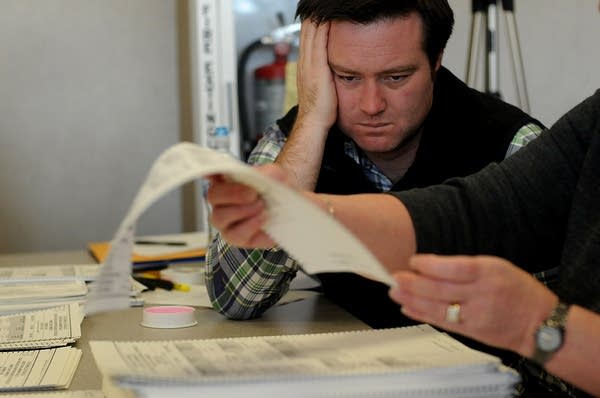Lessons from recount loom large on Election Day
Go Deeper.
Create an account or log in to save stories.
Like this?
Thanks for liking this story! We have added it to a list of your favorite stories.

A year ago on Election Day, Minnesotans entered what would become the longest recount in state history. Today, election officials are applying lessons from that experience to ensure the process goes smoothly.
Ramsey County elections manager Joe Mansky says that following the protracted Senate battle between Norm Coleman and Al Franken, he's made changes that will help ensure every vote is counted.
"What we're done in St. Paul this year to respond to what happened during the recount and the trial earlier this year is that we are taking greater care to process the incoming absentees," he says.
Mansky says from now on every absentee ballot deemed invalid will get a second opinion to ensure it is unacceptable. And when an absentee ballot is deemed invalid, Mansky says election officials will make extra efforts to track down the voter so he or she can try again.
Turn Up Your Support
MPR News helps you turn down the noise and build shared understanding. Turn up your support for this public resource and keep trusted journalism accessible to all.
"Under out state law, we can send you a replacement ballot if we get your ballot and process it within five days of the election," he says. "But this year, even if we get it and have to reject it within five days, we are at least going to contact you and let you know that we did that so that you have an alternative."
Other countries are taking similar measures in hopes of preventing problems with absentee ballots this time around.
The changes are administrative and require no legislative action. But Republican and Democratic members of the state Legislature who specialize in election issues have been meeting informally for months trying to find changes that could win bipartisan support.
Rep. Ryan Winkler, DFL-Golden Valley, has been in those meetings. He says proposals to allow early voting or require voters to have photo identification remain controversial.
But Winkler thinks Republicans and Democrats will find common ground during next year's session to make some absentee ballot changes.
"One of the things we learned from the Coleman-Franken recount was that absentee ballots are treated very differently in different counties, or they can be, and so what we're trying to do it create central ballot counting boards at the city and county level to eliminate some of the discrepancies that you see from precinct to precinct," he said.
Sen. Chris Gerlach, R-Apple Valley, says lawmakers need to do something to restore confidence in the election system when it comes to absentee ballots.
Gerlach has concerns about centralizing the counting, but won't rule it out. He says the solution may be as simple as better training for election judges to ensure everyone is following the same standards.
"This being an election year, conventional wisdom always thinks that it hard to pass these in these years, but I think that this coming year the opposite is going to be true," he says. "I think because it's an election year and now we have the Coleman-Franken case settled at least we have something to grab on to and point to and say these are the changes we need to make."
In addition to administrative and possible law changes, election officials think voters might very well take their role more seriously in light of what happened with poorly marked ballots and errors in absentee ballots.
Mansky says the recount and litigation served as a check on the system which will leave it stronger in the end.
"I am very much of the opinion that, even with the problems that were identified in their session in the recount and the contest, we still have the best system in the country," he says. "Will it get better? I think it already has this year as a result of the recount."




